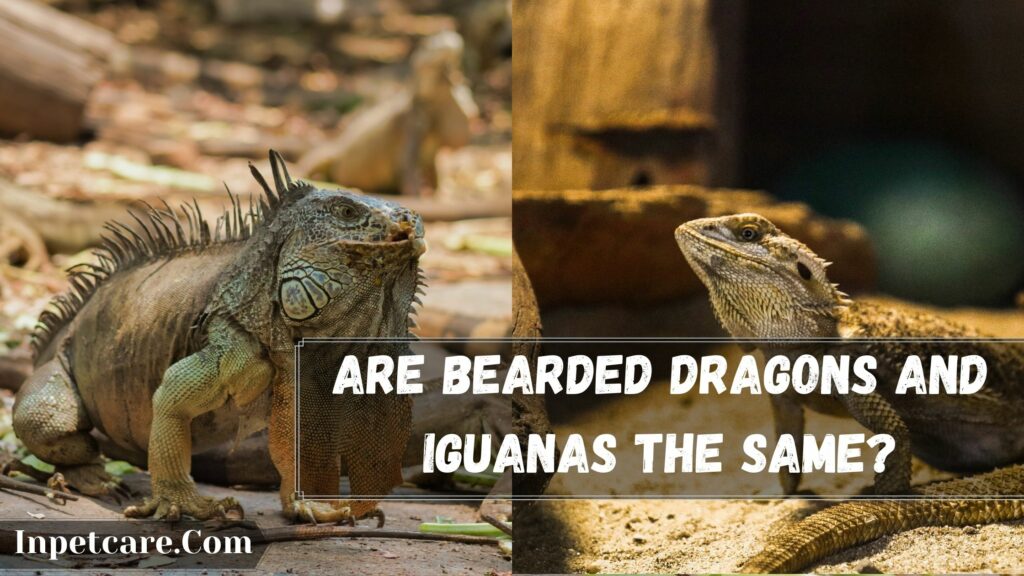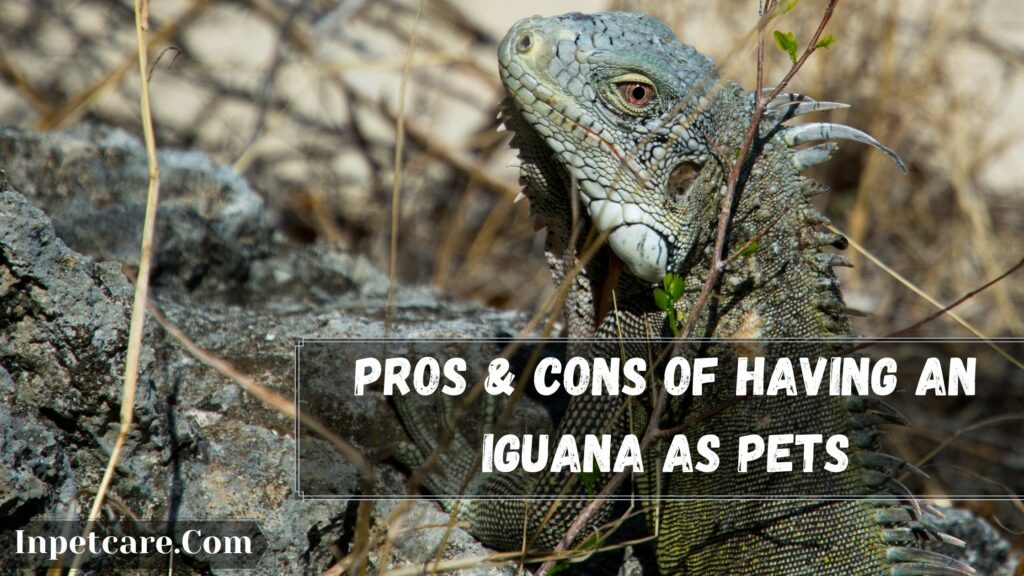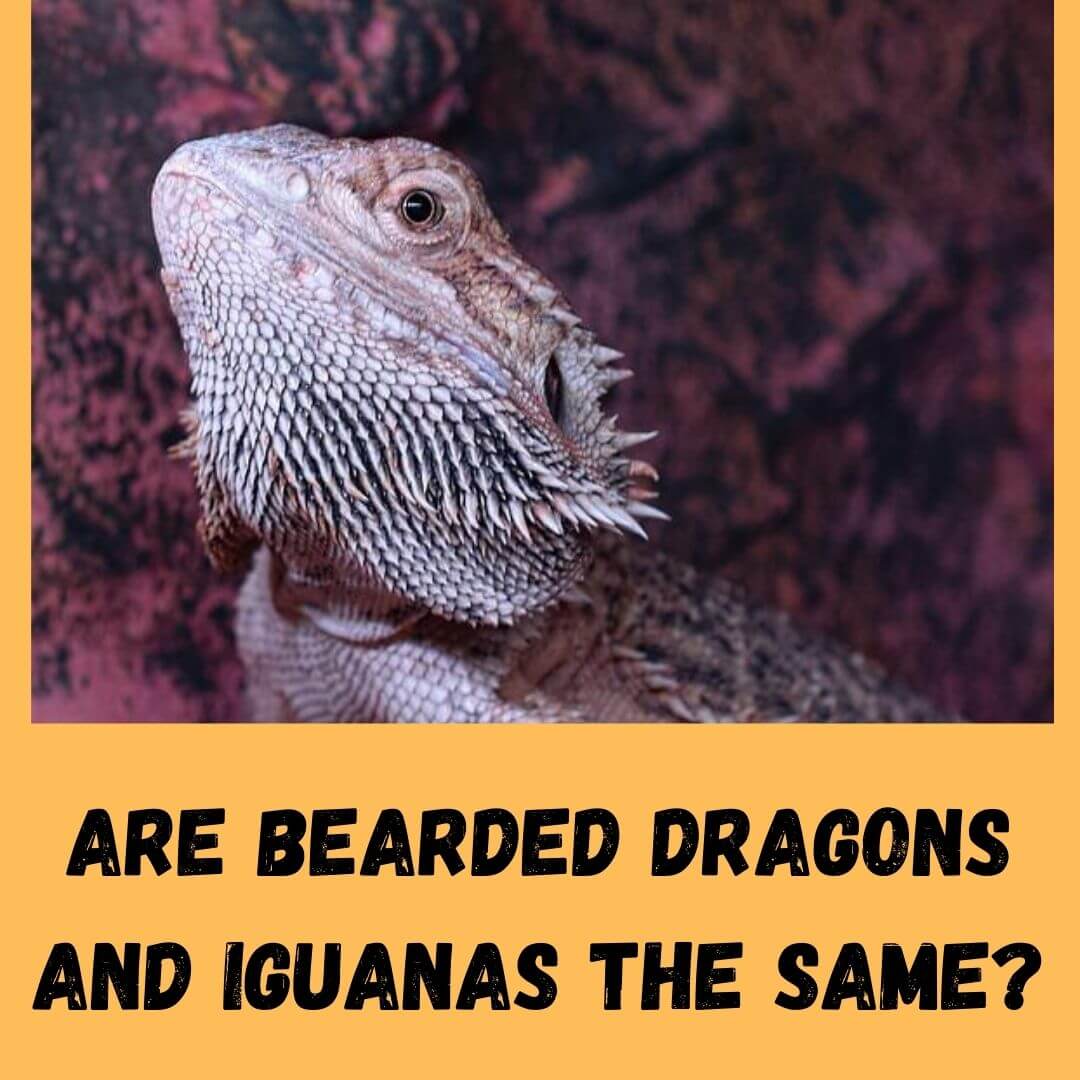If you are confused about recognizing the species or the subspecies of any lizard or reptile, then it can make a huge difference when you consider adding a new pet to your family. Without knowing the difference between the bearded Dragons and iguanas, it is always best to avoid adopting any of these.
Fortunately, in this article, I will answer a very interesting question: are bearded Dragons and Iguanas the same. Before adding any new addition to your family, do your proper research and learn the temperament, the characteristics, and the price of the pet that will compliment you and your lifestyle in the long run.
Adopting any pet, whether beardies or iguanas, is a long-term commitment that should be decided after looking at multiple factors that influence your life and your family’s lifestyle. I have assembled a useful guide on both reptiles and did a head-to-head breakdown of Iguana and bearded Dragon differences.
In this article, I will only be spilling the hard facts about these lizards. We will take a closer look at what makes each of the lizards or species unique and desirable and the pros & cons of adopting one. In the end, you will be the one to make the final decision.
But before that, you should know that an informed decision is always better than taking an impatient decision. It is always best to know what you are getting your hands into and what type of typical companionship a particular reptile or species can make.
For instance, beardies and Iguana are not only intriguing to be with and learn from, but also extremely loyal to any other lizard if you do a proper study on how to handle them.
Therefore, without wasting time, let’s go over both species and see if either one of these can be a potential companion or pet for your family or not. With that being said, let’s jump straight into the question: are bearded dragons and Iguanas the same?
Post Contents
Are Bearded Dragons And Iguanas The Same?

No. Bearded dragons and iguanas are completely different. Bearded dragons are omnivorous and feed on insects, leafy Greens, seeds, flowers, and fruits. At the same time, iguanas are completely herbivorous and forage on plant matter, dark leafy vegetables, some specific flowers, and fruits.
Adding to this, Iguana also has a very strict diet and is quite large as an adult compared to dragons. Bearded dragons come in a manageable size that is smaller than Most Iguanas and can reach up to a length of 24 inches only. Other than this, there are different species of Iguana and many morphs of Bearded dragons to look at.
Both the species can form a strong bond with their owners and are recognized for their peaceful demeanors. When it comes to adopting one of these reptiles, either of them will fit into the right person’s family if cared for properly.
However, their natural differences and growth patterns like factors should always be considered before adopting one. Let’s take a quick look at the difference between the iguanas and Bearded dragons.
Iguana VS Bearded Dragons Differences
Size
Usually, Bearded dragons are smaller than most Iguana and will grow between eating 18-25 inches long only. Their weight should be around 0.5-1.5 pounds. Talking about Iguana, they are naturally much larger and will grow between 4.5-and 6 feet long.
Some species of iguanas can even grow longer. When it comes to having one as a pet, they are pretty easy to handle and even carry around compared to Iguana. They have been seen riding on their owner’s shoulders while doing some quick errands. When it comes to taking an Iguana, they can be much heavier than a Beardie with around 20-30 pounds.
Diet
As of now, we already know that both species have different dietary needs. Iguanas are completely herbivorous, whereas Bearded dragons are omnivorous. As a pet, you will need to feed a dependable source of protein in the form of various live insects to beardies which might seem gross to novices.
When it comes to providing an Iguana, you will have varieties of options in your kitchen as they usually forage on leaves of trees and shrubs. If handling or keeping live insects freaks you out, you can also pass on getting a Bearded dragon.
On the other hand, you can also get over the fear of handling live insects by getting a Bearded dragon. Adding to this, when it comes to the cost of feeding, beardies will need more budget when compared to iguanas.
You can expect to spend over $10-25 dollars per week for your beardie’s diet, and it can be even more depending upon the age of your Bearded dragon.
You can expect to spend much less when it comes to Iguana since you will only need some occasional fruits and vegetables. You will only pay $30-$40 a month to feed your adult Iguana for Iguana.
Cage Setup
If you want to know which reptile comes with the easier cage setup, I recommend going with the bearded dragons. A bearded dragon is usually easy to care for if kept in the right sized tank and in proper condition. When it comes to having an iguana, you will need a much larger space for them to thrive.
Most adult green iguanas will need a cage that is at least 6 feet wide by 6 feet tall and 3 feet Deep. An adult can be kept in a 75-gallon tank if there is a proper ambient temperature. Bearded dragons also need an appropriate area for basking and hiding places, whereas iguanas need climbing obstacles.
Many important things are necessary to consider when setting up their cage. Bearded dragons also need a UVB bulb and a basking bulb with lots of hidings and some basic substrate. You can expect to spend anywhere from $150 to $450 for a good beardie’s cage.
You can expect to pay over 500 dollars to a thousand on the extremely high end for an Iguana tank setup. Iguana’s enclosures are not cheap either, as they need over 100 cubic square feet of space. Their cage alone can cost you over 500 dollars.
Therefore I would recommend you always get a custom-made cage or build your coop according to the needs of your reptile. Being arboreal, Iguanas love living in trees. So, you will have to offer them plenty of height and obstacles to climb.
It is always recommended to have a cage at least 6 feet high. An ideal cage height for keeping Iguana is between 8-and 9 feet.
Life Expectancy
A healthy Iguana can live for over 20 years. However, the average life expectancy of an Iguana is between 12-15 years if cared for properly. Again, Iguana lives longer if cared for properly, as many have been reported living into their 20s. Talking about bearded dragons, they have a lifespan of about 8-14 years on the high end. Some specific beardies may also exceed 14 years if cared for properly but only in rare cases.
Cost
Both species usually come in a similar price range. You’re expected to pay anywhere from around $20-$150 on the cheaper end of the spectrum for a bearded dragon. It can also be higher depending upon the type of morph it is.
For Iguana, you can expect to pay around $15-$100 or even up to $150 depending upon the species of iguanas you are getting. The size and the species of Iguana play a huge role in adoption costs. Always remember that depending on what subspecies or morph, the price will vary.
Which One Is Best?
If you are starting, I recommend you always go with the easiest option. The bearded dragon will be the best choice, to begin with, as they are relatively easy to handle because of their small size. When it comes to adopting an Iguana, their size plays a huge role as they can be quite large, over 5 feet long.
Adding to this, iguanas are hard to care for than bearded dragons, just by the sheer space, they will require. Below are the pros and cons of having either of these reptiles as pets for beginners.
Pros & Cons Of Having An Iguana As Pets

5 Pros of Iguana As Pets
- Herbivorous: Less Expenditure For Their Food.
- Long Lifespan: Great for long term companionship.
- Big: Fewer health problems.
- Smart: Easy to tame.
- Exotic: A rare and unusual pet to have
5 Cons of Iguana As Pets
- Aggressive: Can btw
- Space: We need plenty of space
- Cost Of Ownership: An exotic pet needs a budget on the higher end.
- Need Proper Care & Attention: Not best for the novice or to begin with
- Not Good With Other Pets Or Kids
Pros & Cons Of Having A Beardie As Pets
5 Pros of Beardie As Pets
- Safe. Not going to harm anyone unless they are threatened.
- Intelligent. They’re relatively easy to tame.
- Friendly: They’re extremely friendly with strangers and kids.
- Easy To Take Care Of: They’re easy to care for if studied properly.
- Small In Size: Easy to handle.
5 Cons of Beardie As Pets
- Insectivorous: They also need to be fed live insects.
- Expensive Diet: The diet can be costly due to living feeder insects.
- Fragile: They’re relatively docile, prone to injury and accident.
- Heating. They need a proper basking area and a heating lamp.
- Territorial. They are highly territorial and won’t get along with other tankmates unless it’s of the same species but of a different gender.
Conclusion
By now, hopefully, I have been able to clarify the question: are bearded dragons and iguanas the same? I have tried my best to give you all the ideas on a good pet for you and your family. Let me say that bearded dragons are fairly easy to care for due to their small size but are pretty much expensive when it comes to feeding them.
On the other hand, keeping an Iguana can be quite challenging and also need a budget on a higher end. If you happen to adopt Iguana, then a spiny-tailed Iguana or Marine Iguana will be an interesting option. However, if you are leaning toward bearded dragons, go with it, as they are very exciting pets to have.
Regardless of which reptile you choose to move forward with, it is best to do your homework and research each species. It would help if you were a responsible and educated owner, as having one is a long-term commitment. Check our detailed guides on Iguana, and bearded dragons also care.

94% of pet owners say their animal pal makes them smile more than once a day. In 2007, I realized that I was made for saving Animals. My father is a Vet, and I think every pet deserves one. I started this blog, “InPetCare”, in 2019 with my father to enlighten a wider audience.
